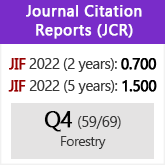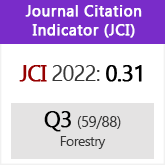The legacy of forest management in tropical forests: analysis of its long-term influence with ecosystem models
Abstract
Forest management can modify key ecosystem attributes, affecting tree growth long after the end of forest management. Long-term influence of current management on forest recovery has been explored with the FORECAST model in Pinus caribaea Morelet plantations in western Cuba. Management for three different products was simulated: biomass, fibre and timber, with differences in rotation length and harvest intensity. Our results show that biomass production can produce ecosystem degradation that may need centuries to recover. If fibre is the objective of management, ecosystem recovery would be faster than managing for bioenergy. However, only if timber is the final objective the ecosystem might be able to keep similar conditions to the natural forest. In conclusion, our results show that forest management legacies can be a key factor in accelerating of delaying forest ecosystem recovery, depending on the exploitation intensity. These results also show the utility of ecosystem-level management models to analyze alternative management scenarios and their effects on the forest ecosystem.Downloads
© CSIC. Manuscripts published in both the printed and online versions of this Journal are the property of Consejo Superior de Investigaciones Científicas, and quoting this source is a requirement for any partial or full reproduction.
All contents of this electronic edition, except where otherwise noted, are distributed under a “Creative Commons Attribution 4.0 International” (CC BY 4.0) License. You may read here the basic information and the legal text of the license. The indication of the CC BY 4.0 License must be expressly stated in this way when necessary.
Self-archiving in repositories, personal webpages or similar, of any version other than the published by the Editor, is not allowed.















